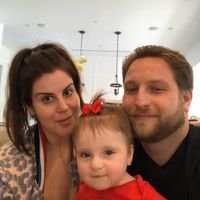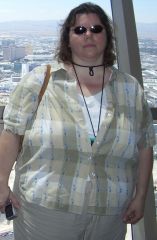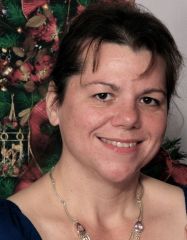-
Content Count
73 -
Joined
-
Last visited
I was a skinny child and adolescent, but I developed PCOS (poly-cystic ovary syndrome) in my early 20s. The endocrine complications were pretty horrifying (unwanted hair growth on my chin, thinning hair on top, acne, irregular menstrual cycles, infertility, etc) but the gradual weight gain was the worst. I put on an average of 10# a year for 20 years. The weight gain simply exacerbated the other symptoms. It became an awful spiral that didn't seem to improve no matter what I did -- so I gave up.
My younger sister also had PCOS but her weight gain was far more dramatic -- she had developed bulemia in her struggles with her weight as a teenager. She ended up having the RnY when she was 25 and 350#, back in 1995. She experienced the rapid, drastic weight loss most bypass patients do, and embarked on an amazing new life. Unfortunately, she never really tackled her eating disorder and was terrible about keeping up with her nutritional needs. After 10 years she was malnourished and developed severe pancreatitis. The changes to her GI tract made things difficult. Two pancreatic surgeries were aborted and a third was successful only after instruments were re-designed to handle the changes the RnY had made. She died after two years of agony, in 2008.
6 months before she died, my sister told me about the Lap Band and begged me to consider it. She said she would have chosen it over the Bypass if it had been an option at the time, but regardless, she didn't have any regrets over having bariatric surgery -- she figured it had saved her life. I did the research, liked what I learned, and initiated the process of having lap band surgery. I was banded 7 months after my sister died.
While I didn't have an eating disorder per se, I am a sensualist-foodie type who turned to food for comfort when I gave up on fighting PCOS, so recognized that I had to change my relationship with food if I was going to lose weight using the Band, which does not have the added oomph of mal-absorbtion to speed weight loss. My surgeon had told me that bariatric surgery was the only real hope for PCOS patients, but even so, due to all the excess hormones floating around in my system, weight loss was going to be much slower for me than for the average bariatric patient.
It's been 4 years, and I've lost 130#, or 75% of my excess weight. It was very slow going at first, but I didn't give up, and year-over-year I've lost more weight. I expect to take off the last 35# to 50# in the coming year. I freely admit that I would loose weight faster if I was a more enthusiastic exerciser. The best part about the weight loss is that my PCOS symptoms have improved dramatically. My infertility suddenly reversed and I woke up pregnant at age 43. The unwanted hair growth is less obvious, my menstrual cycle is almost normal, the acne non-existent. My skin is soft and smooth.
I'm living a life that I love, and I owe much of it to the hope that the Lap-Band gave me. It isn't a magic pill that gave me a new body a year later, but it is a tool I've learned to use to control portion sizes and keep me on track. If I'm lucky, the Band will be with me for the rest of my life. If I'm unlucky and experience gastro-intestinal issues like my sister did, I'm grateful to know that the Band can be removed and my GI tract returned to its normal architecture with little drama or trauma.
Kelly
Dec 2012
My younger sister also had PCOS but her weight gain was far more dramatic -- she had developed bulemia in her struggles with her weight as a teenager. She ended up having the RnY when she was 25 and 350#, back in 1995. She experienced the rapid, drastic weight loss most bypass patients do, and embarked on an amazing new life. Unfortunately, she never really tackled her eating disorder and was terrible about keeping up with her nutritional needs. After 10 years she was malnourished and developed severe pancreatitis. The changes to her GI tract made things difficult. Two pancreatic surgeries were aborted and a third was successful only after instruments were re-designed to handle the changes the RnY had made. She died after two years of agony, in 2008.
6 months before she died, my sister told me about the Lap Band and begged me to consider it. She said she would have chosen it over the Bypass if it had been an option at the time, but regardless, she didn't have any regrets over having bariatric surgery -- she figured it had saved her life. I did the research, liked what I learned, and initiated the process of having lap band surgery. I was banded 7 months after my sister died.
While I didn't have an eating disorder per se, I am a sensualist-foodie type who turned to food for comfort when I gave up on fighting PCOS, so recognized that I had to change my relationship with food if I was going to lose weight using the Band, which does not have the added oomph of mal-absorbtion to speed weight loss. My surgeon had told me that bariatric surgery was the only real hope for PCOS patients, but even so, due to all the excess hormones floating around in my system, weight loss was going to be much slower for me than for the average bariatric patient.
It's been 4 years, and I've lost 130#, or 75% of my excess weight. It was very slow going at first, but I didn't give up, and year-over-year I've lost more weight. I expect to take off the last 35# to 50# in the coming year. I freely admit that I would loose weight faster if I was a more enthusiastic exerciser. The best part about the weight loss is that my PCOS symptoms have improved dramatically. My infertility suddenly reversed and I woke up pregnant at age 43. The unwanted hair growth is less obvious, my menstrual cycle is almost normal, the acne non-existent. My skin is soft and smooth.
I'm living a life that I love, and I owe much of it to the hope that the Lap-Band gave me. It isn't a magic pill that gave me a new body a year later, but it is a tool I've learned to use to control portion sizes and keep me on track. If I'm lucky, the Band will be with me for the rest of my life. If I'm unlucky and experience gastro-intestinal issues like my sister did, I'm grateful to know that the Band can be removed and my GI tract returned to its normal architecture with little drama or trauma.
Kelly
Dec 2012
Height: 5 feet 7 inches
Starting Weight: 360 lbs
Weight on Day of Surgery:
Current Weight: 229 lbs
Goal Weight: 185 lbs
Weight Lost: 131 lbs
BMI: 35.9
Surgery: LAP-BAND
Surgery Status: Post Surgery
First Dr. Visit: 09/15/2007
Surgery Date: 08/30/2008
Hospital Stay: Outpatient
Surgery Funding: Insurance
Insurance Outcome: 1st Letter Approval
KellyGram's Bariatric Surgeon
Oregon Weight Loss Surgery, LLC
2233 - F Willamette Street
Eugene, Oregon 97407
2233 - F Willamette Street
Eugene, Oregon 97407







